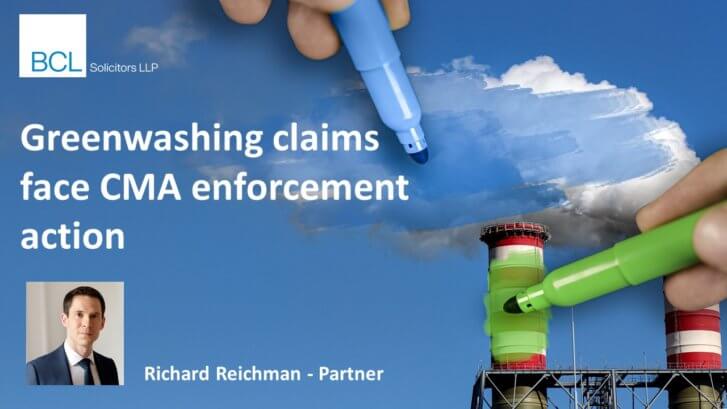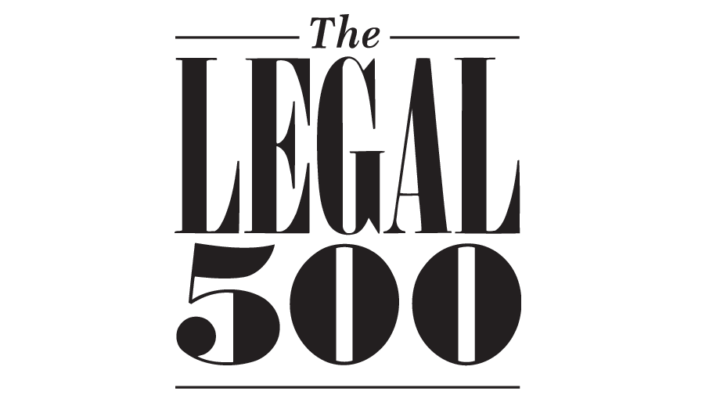Against the background of the UK’s aim to achieve net carbon neutrality by 2050 and an increasing awareness of climate change and other ESG issues impacting consumer choices BCL partner, Richard Reichman explores why regulators are beginning to take greenwashing seriously and what it could mean for businesses that make such unsubstantiated claims.
The Competition and Markets Authority (CMA) has issued its final guidance on misleading environmental claims and fired a warning shot to businesses: either secure compliance now or face enforcement action in the new year. Other UK regulators also have greenwashing on their radar, with the Financial Conduct Authority’s most recent business plan prioritising promoting trust and protecting consumers from misleading ESG products following a £200 billion inflow to European sustainable funds in 2020 (an almost 50% increase on 2019).
This shift in regulatory focus poses serious compliance risks for businesses that make green claims which cannot be substantiated.
The CMA and Greenwashing
The CMA is the UK’s primary competition and consumer authority. Its 2020/21 Annual Plan included an intention to improve its understanding of green claims and where appropriate use its powers to correct false or misleading statements. The CMA launched its investigation into misleading environmental claims in November 2020 and began consulting on new guidance in May 2021.
The issue posed by greenwashing – a play on the term whitewashing – is that consumers are increasingly faced with claims which are vague and unclear such as ‘eco-chic’ or ‘environmentally friendly’. These terms can greenwash a product and reassure a consumer that they are making environmentally conscious purchasing decisions. Such claims therefore harm consumers and other businesses seeking to be green, as well as indirectly harming the environment. With more than 50% of UK consumers taking environmental considerations into account in their life and increasingly seeking to shop sustainably, and an estimated UK market for sustainable products in 2019 of £41 billion, this is becoming a particular concern. The CMA participated in a ‘web sweep’ in November 2020 and discovered that more than 40% of global environmental claims assessed were potentially misleading.
The Guidance
The new guidance is intended to help businesses understand and comply with their existing obligations under consumer protection law when making environmental claims. It applies to all businesses (including manufacturers, wholesalers, distributors and retailers) selling all goods and services in all sectors of the economy.
The CMA defines environmental claims as “claims which suggest that a product, service, process, brand or business is better for the environment”. The guidance states that such claims include those that suggest or create the impression that a product or service:
- has a positive environmental impact or no impact on the environment;
- is less damaging to the environment than a previous version of the same good or service; or
- is less damaging to the environment than competing goods or services.
The CMA considers that environmental claims are genuine when they properly describe the impact of the product, service, process, brand or business, and do not hide or misrepresent crucial information. Conversely, misleading environmental claims occur “where a business makes claims about its products, services, processes, brands or its operations as a whole, or omits or hides information, to give the impression they are less harmful or more beneficial to the environment than they really are”.
The Six Principles
The guidance sets out six principles (unchanged from the principles proposed during the consultation) to assist businesses to comply with general consumer protection law:
- claims must be truthful and accurate
- claims must be clear and unambiguous
- claims must not omit or hide important relevant information
- comparisons must be fair and meaningful
- claims must consider the full life cycle of the product or service
- claims must be substantiated
The principles firmly have in mind the prohibited unfair commercial practices of misleading actions and omissions under the Consumer Protection from Unfair Trading Regulations 2008 i.e. ensuring that consumers are not prejudiced by the provision of false or misleading information, either by action or omission.
The guidance notes that “broader, more general or absolute claims are much more likely to be inaccurate and to mislead”. The CMA singles out unclear terms such as ‘green’, ‘sustainable’ or ‘eco-friendly’, especially if used without explanation, which are likely to suggest a positive environmental impact or no adverse impact. Businesses are likely to be on safer ground with more specific claims.
The guidance emphasises the overall presentation of an environmental claim i.e. the combined effect of the images (for example, including a green leaf image), logos, packaging, colours and wording.
The importance of considering the whole product life cycle in any environmental claim is also noted. The guidance states that “the overall [environmental] impact of all its components” needs to be considered to avoid “cherry-picking beneficial aspects” which risks misleading consumers, particularly if other aspects cause a greater or significant negative impact on the environment. The CMA suggests that if environmental impact information would make consumers think twice about their decisions then it is a strong indicator that it should be included in a claim.
Significantly, the guidance states that businesses should hold “robust, credible, relevant and up to date evidence” that supports environmental claims. This may be scientific or other evidence. The more independent and widely supported the evidence is, the more likely it will support a claim. This evidence would be crucial if any environmental claims were challenged. The CMA’s preference for specific claims is also relevant to the substantiation principle as broader claims (e.g. ‘environmentally friendly’) may be more difficult to prove.
Enforcement
The guidance does not relate to any new offences but signals an intention to act to enforce existing legislation in the context of greenwashing. There are various offences which could potentially be committed by making misleading green claims. These include general consumer protection offences and offences such as fraud. There are also specific sectoral rules which businesses need to consider.
Offences under the Consumer Protection from Unfair Trading Regulations 2008 are punishable by a fine without upper limit and/or a custodial sentence of up to two years. There is a due diligence defence for businesses that take all reasonable precautions and exercise all due diligence to avoid the commission of an offence. Fraud offences are similarly punishable by a fine without upper limit but have a maximum custodial sentence of up to ten years. Fines for regulatory offences have increased substantially over the last decade with very large organisations facing multi-million-pound penalties in serious cases.
The CMA has adopted the reasonable approach of giving businesses an opportunity to comply before taking enforcement action. Other than for egregious breaches, businesses will have until the new year to secure compliance. The CMA will carry out a full review of misleading green claims both on and offline at the start of 2022. Specific sectors have been name-checked by the CMA as potentially facing scrutiny, such as the textiles and fashion, travel and transport, and fast-moving consumer goods (food and beverages, beauty products and cleaning products) sectors. They are at particular risk of enforcement activity after the ‘amnesty period’.
What next?
Businesses need to digest and apply the guidance to their current and future green claims, as well as reviewing other ESG claims which may offend consumer protection legislation. Any existing environmental claims should be reviewed before the end of the year. Claims must be truthful, accurate, unambiguous and clear. They should be as specific as possible, rather than broad and vague. Importantly, all claims must be able to be substantiated with evidence. To benefit from the due diligence defence, businesses should take all reasonable precautions and exercise all due diligence, comprehensively recording steps that have been taken.
There will inevitably be increased regulatory activity in this area and, with an ongoing consultation regarding proposed changes to the CMA’s enforcement toolkit, including the ability to directly fine organisations up to 10% of global turnover for consumer protection breaches, businesses are likely to face a stronger CMA in the future. A recent £90 million fine for pollution offences also highlights the potential serious consequences of environmental regulatory breaches and adds to the risk level.
Following the CMA’s warning it will be looking for a corporate defendant to make an example of and deter others from making murky green claims. The extent of the guidance (56 pages) suggests that these are not simple issues and the CMA may face some difficulties in successfully challenging certain green claims as misleading.
Businesses will need to consider the guidance carefully over the coming months and ensure they have evidence to back up their green claims. If you would like to discuss this or any related issues in more detail please contact Richard Reichman in the strictest confidence.




